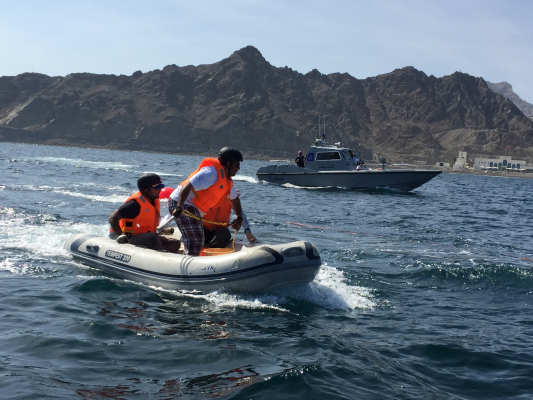An experimental success – entanglement and stranding
response training in Oman
The latest IWC entanglement training workshop has just finished in Oman, and has registered a number of significant ‘firsts’. This was the first entanglement workshop on the Arabian Sea coast, expanding safe and effective entanglement response into a new region. At the request of the Government of Oman, its remit was extended for the first time to cover both entanglement and stranding responses. When 36 spinner dolphins were beached nearby, it also became the first of these workshops to handle a real stranding event.
The training was provided by the IWC in partnership with the Center for Coastal Studies, Provincetown USA (CCS) and led by David Mattila who coordinates the Global Entanglement Response Network. The strandings component of the workshop was conducted by Brian Sharpe of the International Fund for Animal Welfare who is working with the US Government (NOAA) and stranding responders from other countries to develop international principles and guidelines for stranding response, similar to the guidelines for entanglement response that have been developed by the IWC’s expert group.
The workshop was attended by a wide range of participants including cetacean scientists, a veterinarian from Oman's department of Royal Court Affairs, and policy officials from organisations including the Ministry of Environment and Climate Affairs (MECA), the Navy, Coastguard, Fisheries bodies and Non-Governmental Organisations. Lasting a week, two days of classroom theory and boat-based, practical entanglement response training were this time accompanied by two days of training in beach response to stranded cetaceans. Some of the new skills were tested when spinner dolphins stranded a short distance away. Sadly the dolphins had been dead for four days. It was not possible to determine cause of death but the group was able to practice data collection methods learnt at the workshop, for example obtaining accurate records of length, sex and species of the stranded animals.
A further two days were also allocated, to enable discussions focused specifically on the Arabian Sea area. Oman’s regional leadership was noted by the workshop which considered a possible expansion of this lead through partnerships with the newly formed Arabian Sea Whale Network and the Abu Dhabi regional office of the Convention on Migratory Species. The trainers also ensured that participants were aware of the expert advice available through the IWC, on entanglement, stranding, and related issues such as cetacean disease.
As well as the IWC and CCS who work in partnership to build entanglement response capacity around the world, the week of training was supported by MECA, the USA Department of the Interior (through a partnership agreement with Oman), IFAW, the Coastguard of Oman and Five Oceans. The experimental format of the workshop delivered a package of training tailored to suit the needs of the Government of Oman and the trainers expressed thanks for the warm welcome and generous hospitality of the MECA and all involved.
To read more about the Global Entanglement Response Network click here.
To read more about cetacean stranding click here.
To read more about Center for Coastal Studies click here.
To view a photo gallery of entanglement response training workshops click here.

